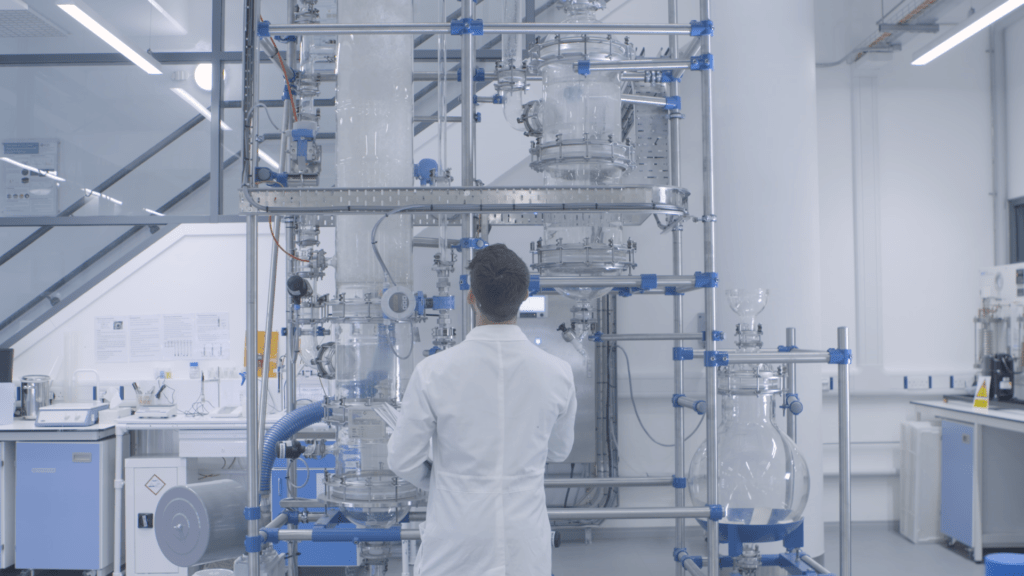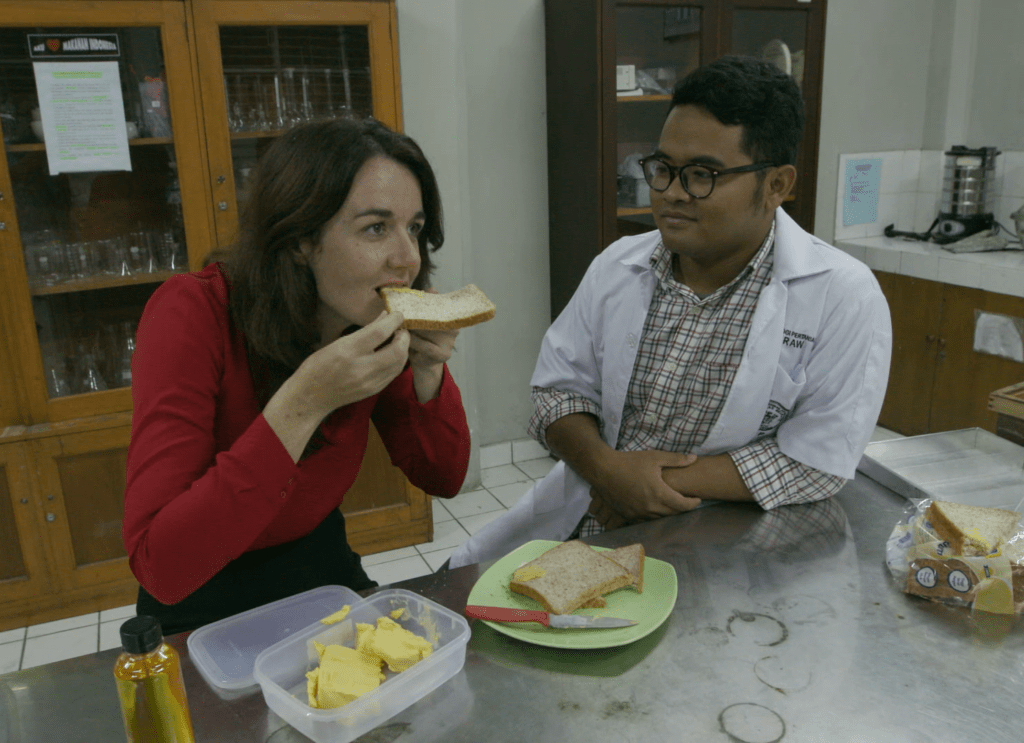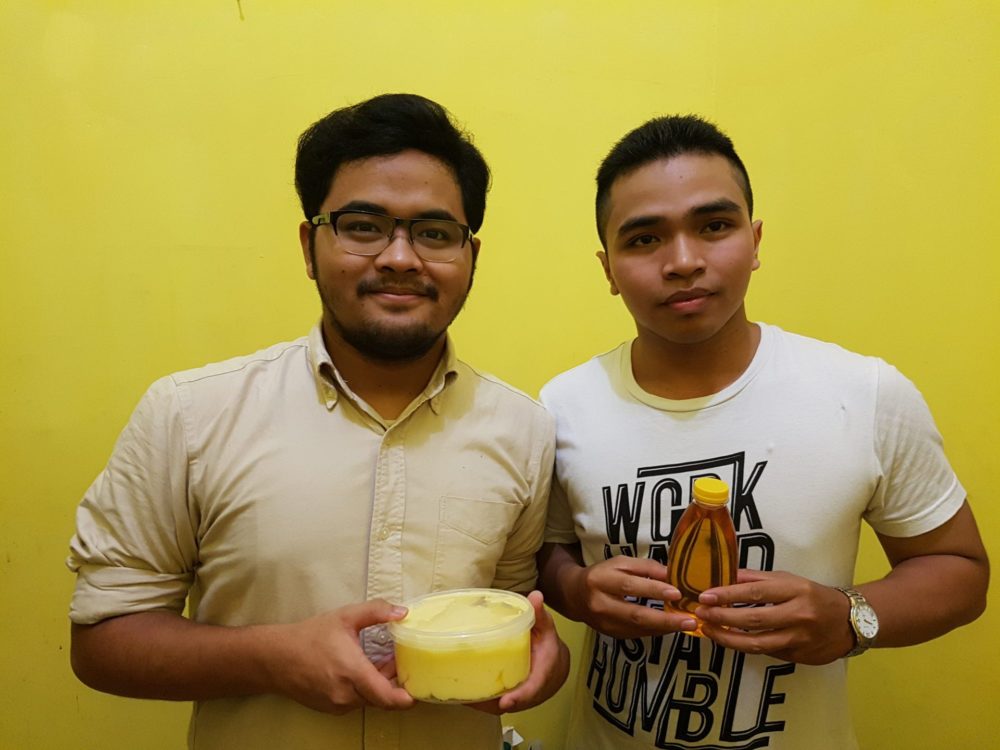According to the UN, food and agriculture account for 70% of global freshwater use, take up 50% of Earth’s habitable land and produce a quarter of all greenhouse gas emissions (GHGe).
Most of this stems from animal agriculture. Astonishingly, when us humans are excluded from the count, livestock make up 98% of all mammals on Earth by biomass.
Clearly, if we as a society are to slow the advance of climate change, we need to radically overhaul our methods of food production.
In the latest of our series profiling our partner GROW‘s 2021 Impact Accelerator cohort, we’re talking to two startups creating novel food ingredients that could reduce our world’s reliance on these environmentally destructive activities.
They are:
- Biteback Biotechnology (Singapore) – Insect bio-refinery converting agro-industrial waste into a healthier drop-in replacement for palm oil, biofuels, and other functional ingredients.
- Cellular Agriculture (UK) – Novel bioreactor design for production of cell-based meats, dramatically increasing yield and reducing costs for the future of animal protein production.
For this roundtable discussion, AFN is speaking to:
- Illtud Llyr Dunsford, CEO, Cellular Agriculture (ID)
- Mush’ab Nursantio, co-founder and CEO, Biteback (MN)
AFN: What does ‘impact’ mean to you personally, and to your organization?
ID: My personal interest in impact stems from my own family history in traditional agriculture. When we discuss the topic of food production, we often focus on the impact of animal agriculture, and specifically on GHGe and their effect on climate change. However, as a food producer and someone that still farms, I’m acutely aware of the immediate effects that food production in all its forms has on the planet. The industrialization of food production, though efficient, has contributed significantly to both biodiversity loss and the disruption of biogeochemical flows.
The challenge that we face, with a growing human population, is how to produce enough food for everyone in a manner that isn’t detrimental to the planet. I previously diversified my family farming business and established a specialist meats business based on regenerative agricultural practices. However, the reality that I faced in that business was that high nature value farming comes at a price, and the food produced was not accessible to all. My career shift to the cultured protein industry came with the realisation that this was a technology that did not require social change, but could provide consumers with a product of equal quality, at price parity without a cost to the planet.
MN: After studying agricultural technology at university, I realized the current food system is broken. It has helped us to industrialize food production and make food cheaper for consumers, but lower prices don’t show the hidden cost to the environment, to our health, and to the overall wellbeing of our society.
My co-founder and I started this company as part of a university research project. Initially, we looked at insects as a source of protein – but soon realized the potential for oil-based products, especially as an alternative to palm oil. Growing up in Indonesia we have witnessed the destruction of natural resources due to the ever-increasing demand for palm oil and the endless expansion of palm plantations. We also strongly believe that a sustainable solution developed by an Indonesian-led company will help increase awareness from other young Indonesians and spur other developments in innovation around conservation and sustainability in our country.
AFN: What problem is your company trying to solve, and how does your technology offer a solution?
MN: As the most-used vegetable oil on the planet, palm oil can be found in almost half of all packaged items in supermarket. To meet the demand, countries like Malaysia and Indonesia — the two largest producers of palm oil — have cleared millions of hectares of their rainforests to make room for palm plantations.
Unfortunately, palm oil remains the most efficient commercial vegetable oil in terms of yield and resource utilization. That’s why we’ve looked into other sources. We are extracting fats from giant mealworm [Zophobas morio] larvae. They reproduce so rapidly that they outdo oil palm in yield by at least 37 times in the same area of land. The fatty acids they produce offer the same properties as those from oil palm, such as palmitic, oleic, and linoleic acids, with high levels of unsaturated fats and omega-3.
At Biteback, we are developing refining and fractionation technology to transform the extracted giant mealworm fats into functional ingredients, from cooking oil, butter and margarine alternatives, surfactants and cosmetics ingredients, to biofuels.
ID: The cultured protein industry has come a long way since the first burger in 2013, with significant cost reductions to deliver the first regulated food product in December of last year. However, we’re delivering bioprocess technology at industrial scale, and not the niche. We’re not food manufacturers, we’re engineers – and what we focus on is providing an engineering solution for the technology gap that exists between market entry, industrial scale, and — ultimately — price parity. We’re not just developing the bioreactor, but designing the complete factory, the tanks, pumps, filtration units, and the 14 kilometers of associated pipework!

AFN: Could you share some case studies and figures to illustrate the impact your technologies and solutions could create?
ID: My co-founder, Prof Marianne Ellis, has worked with Dr Hanna Tuomisto since 2013 on a number of iterations of life cycle analysis for the cultured meat industry. Their early work was pivotal for those pioneer companies in the space to raise finance as it demonstrated the potential impact of cultured meat technologies.
They continue to refine this analysis, and the most recent data suggests that our hollow fibre technology can deliver real impact; a 90% reduction in GHGe, 90% reduction in land use, and a 50% reduction in water use in comparison to livestock production. We’re proud to be one of the few companies in the space with direct quantifiable analysis of the impact that our technology affords.
MN: There is no [plant] alternative in the market that has better yield, and requires less fertilizer, pesticide, and energy input, than palm oil. Our solution, at scale, could help reduce palm oil dependency and limit its expansion rate, which causes the release of carbon dioxide into the atmosphere through slash-and-burn practices and destroys habitats for people and endangered wildlife.
Biteback can enable us to meet our nutrient needs without necessarily adding new resources. The insects can grow on biomass from agricultural waste, such as wheat husk, rice husk, sugarcane bagasse, and palm press cake waste.
Introducing processed insects in food products is seen as a way to lower the barrier for insect consumption by end-consumers. The nutritional quality of insect oils based on FA properties and profile has been described as intermediate between vegetable oils and animal fats in terms of FA profile. The use of insect oils and fats as food ingredient could accelerate the adaption of this novel food source since it decreases visibility, reduces complexity and increase convenience, on their turn increasing liking and consumer acceptance.
AFN: What gives your company its competitive edge and differentiates it from others trying to solve the same problem?
MN: Synthetic palm oil alternatives being developed [aren’t expected] to be economical on a commercial scale, while [other alternatives using] black soldier fly and ground coffee waste extract have lower yield and complicated supply chains at scale. Our insect-based alternative has versatility, with fatty acids covering most of what’s available in palm oil, ease of scaling using industrial biomass as feedstock, and lower cost as the protein byproducts have high market value.
As for comparison with other insect-rearing companies, there are many startups focused on high-volume production of fast-breeding insects such as black solider flies, mealworms, and crickets, with a primary focus on protein. We see a longer-term opportunity to carve out a niche [focused] on higher value, more versatile products such as oil. We see an opportunity to create value-added processes and technology that can be licensed and incorporated into [other companies’] models, or run as a standalone business as part of a larger and more developed insect value chain.
ID: Cellular Agriculture uses perfusion bioprocess; our core IP centers on hollow fiber membrane bioreactor technology which mimics the human body’s vascular system, and a newly developed pseudo-vascularised system for cell differentiation. Our bioprocess allows nutrients to be targeted directly at the cells and offers the largest theoretical cell densities of any bioreactor systems, delivering significant reductions in footprint, utility, and labor costs.
In 2020 we conducted a techno-economic analysis of incumbent technology as part of the Merck Accelerator program. Our system represents a 300x reduction in footprint to incumbent technologies, with a theoretical target of 1000x reduction. We can also reduce capital costs by 10% and operational costs by up to 70%. However, the promise of recycling and valorization within the wider bioprocess delivers a forecast operational cost reduction of 98%.

AFN: What have been some of the biggest challenges for your company so far? What have been some of the biggest successes?
ID: As an early company in the cultured protein industry, launching in April 2016, our focus differed greatly from the very start to those ‘full-stack’ companies in the space. Developing a novel bioprocess necessitated a differing pathway, resulting in a reliance on undiluted funding streams to deliver empirical scientific discovery – often working with academic partners to tackle technical challenges. Designing next-generation hardware is a costly and timely process, but having recently celebrated our fifth birthday as a company, we’re confident that the next few years will pay dividends on the hard-fought resilience of our early years.
As a small team, we’re extremely proud of our successes: one of the earliest cultured protein companies in Europe, and the first in the UK; the first to derive UK government support for the industry; and, on displaying our proof-of-concept at the NEMO Science Museum in Amsterdam in 2019, we were the first company globally to publicly display new technology for the industry.
MN: Biteback is in a strong position with potential customers. By nature of our products, industry, and company story, we have been able to attract a high level of interest and engagement that would otherwise require a significant sales effort for a company of our stage.
Our biggest challenge is less about the costs and resources required to build a customer network, but to be able to meet the demand we already see strong signs of. Now the main potential bottleneck is in scaling up our operations and setting up a pilot plant to validate our technology.
AFN: What was your motivation to join GROW Impact Accelerator? How does it align with your objectives for the near-future?
MN: Given our potential impact as a company, the GROW Impact Accelerator offers valuable support in shaping our foundation and operations to keep aligned with ESG principles.
The vast network in government, capital, and industry from GROW and AgFunder was our main motivation to join the program. In the first few weeks of the program, we were already in touch and working with a Singaporean government agency and potential industry customers thanks to intros from the GROW team.
ID: Having previously turned down offers of investment in favour of undiluted funding, joining the AgFunder family was a significant decision for us – but it felt like the right fit for us as a company and at the right time in our own journey. AgFunder represents a broad network of investors, and with the additional support and mentorship offered, the GROW program was attractive for us to support our growth strategy as we look to bring our first systems to market.
Had it not been for Covid-19, we would undoubtedly be on the ground in Singapore. The regulatory clearance for the first cultured protein product by the Singapore government in 2020 has shifted the industry’s focus to Southeast Asia. The GROW Impact Accelerator provides us with access to the Singaporean ecosystem and the proactive, whole-government approach that Singapore provides. Our focus for the period of the accelerator is to build on our existing relationships and look to the opportunities that are to come from the region.





